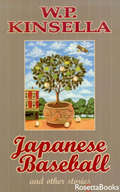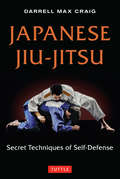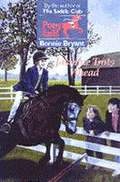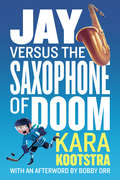- Table View
- List View
Japan Through the Lens of the Tokyo Olympics Open Access
by Barbara Holthus Wolfram Manzenreiter Franz Waldenberger Isaac GagnéThis book situates the 2020 Tokyo Olympics within the social, economic, and political challenges facing contemporary Japan. Using the 2020 Tokyo Olympics as a lens into the city and the country as a whole, the stellar line up of contributors offer hidden insights and new perspectives on the Games. These include city planning, cultural politics, financial issues, language use, security, education, volunteerism, and construction work. The chapters then go on to explore the many stakeholders, institutions, citizens, interest groups, and protest groups involved, and feature the struggle over Tokyo’s extreme summer heat, food standards, the implementation of diversity around disabilities, sexual minorities, and technological innovations. Giving short glimpses into the new Olympic sports, this book also analyses the role of these sports in Japanese society. Japan Through the Lens of the Tokyo Olympics will be of huge interest to anyone attending the Olympic Games in Tokyo 2020. It will also be useful to students and scholars of the Olympics and the sociology of sport, as well as Japanese culture and society.
Japan's Complete Fighting System Shin Kage Ryu
by Robin L. RiellyShin Kage Ryu jujutsu has existed as a fighting system since the nineteenth century, and the literal meaning of the three Chinese characters is "spirit shadow way." Originating in J apan and influenced by Okinawan fighting systems, the art has evolved into one that ip.corporates karate-like kicks, punches, and strikes, as well as the throwing, grappling, and joint techniques of judo. Thus, Shin Kage Ryu is a complete fighting system, one that combines the best elements of karate with those of jujutsu.The unique mix of disciplines in Shin Kage Ryu makes it possible to fight with an opponent in an upright position and, if necessary, take him to the ground and score a victory by grappling or choking. Students are also taught extensive attack and defense techniques with both the sword and knife.Author of the successful Karate Training: The Samurai Legacy and Modern Practice, Robin L. Rielly has written this book as an introduction to Shin Kage Ryu for those unfamiliar with it, and to insure that the knowledge of this fighting art is not lost. It remains a pure martial art, and because it is not practiced in sporting contests, its kata are often closer to real combat. Although in some ways similar to karate kata, advanced black belts in karate agree that the kata of Shin Kage Ryu have a different feeling-one that is both powerful and effective. As such, this book is an essential handbook for every karate practitioner and enthusiast.
Japan's Complete Fighting System Shin Kage Ryu
by Robin L. RiellyShin Kage Ryu jujutsu has existed as a fighting system since the nineteenth century, and the literal meaning of the three Chinese characters is "spirit shadow way." Originating in J apan and influenced by Okinawan fighting systems, the art has evolved into one that ip.corporates karate-like kicks, punches, and strikes, as well as the throwing, grappling, and joint techniques of judo. Thus, Shin Kage Ryu is a complete fighting system, one that combines the best elements of karate with those of jujutsu.The unique mix of disciplines in Shin Kage Ryu makes it possible to fight with an opponent in an upright position and, if necessary, take him to the ground and score a victory by grappling or choking. Students are also taught extensive attack and defense techniques with both the sword and knife.Author of the successful Karate Training: The Samurai Legacy and Modern Practice, Robin L. Rielly has written this book as an introduction to Shin Kage Ryu for those unfamiliar with it, and to insure that the knowledge of this fighting art is not lost. It remains a pure martial art, and because it is not practiced in sporting contests, its kata are often closer to real combat. Although in some ways similar to karate kata, advanced black belts in karate agree that the kata of Shin Kage Ryu have a different feeling-one that is both powerful and effective. As such, this book is an essential handbook for every karate practitioner and enthusiast.
Japan's Ultimate Martial Art
by Darrell Max CraigPredecessor of Judo and precursor of today's ultimate fighting styles, Jujitsu is a martial art developed by the elite samurai class during Japan's feudal days. For centuries, this method of unarmed self-defense proved so successful in combat that it was kept secret and taught to a select few. Based on the author's study with instructors of the Tokyo police department, this book features the traditional techniques of Jujitsu, also known as Ju-Jiutsu. Chapter by chapter, it addresses and demonstrates Kaisho Goshin Budo Taiho Jitsu Ryu (Tokyo police/ self-defense/ martial way/ body techniques). Specific techniques covered include the use of hands, throwing an opponent, attacking vital points with strikes and kicks, and the use of weapons such as the staff. Though designed to accompany training, this fascinating book also serves as a remarkable illustrated guide to the secret art of samurai self-defense.
Japan's Ultimate Martial Art
by Darrell Max CraigPredecessor of Judo and precursor of today's ultimate fighting styles, Jujitsu is a martial art developed by the elite samurai class during Japan's feudal days. For centuries, this method of unarmed self-defense proved so successful in combat that it was kept secret and taught to a select few. Based on the author's study with instructors of the Tokyo police department, this book features the traditional techniques of Jujitsu, also known as Ju-Jiutsu. Chapter by chapter, it addresses and demonstrates Kaisho Goshin Budo Taiho Jitsu Ryu (Tokyo police/ self-defense/ martial way/ body techniques). Specific techniques covered include the use of hands, throwing an opponent, attacking vital points with strikes and kicks, and the use of weapons such as the staff. Though designed to accompany training, this fascinating book also serves as a remarkable illustrated guide to the secret art of samurai self-defense.
Japan, Korea and the 2002 World Cup
by John Horne Wolfram ManzenreiterThe football World Cup is unquestionably the biggest sporting event in the world. This fascinating collection of papers examines the background to the 2002 World Cup Finals, held in Korea and Japan, and explores the event's profound social, cultural, political and economic significance. The book offers important insight into topics such as: * the development of professional football in Korea and Japan* the political and diplomatic significance of the first co-hosted World Cup* FIFA and the 'back stage' dealing behind the World Cup* football as a global culture and its impact on 'traditional' East Asian structures. This book is essential reading for anybody looking to understand the power of sporting 'mega-events' and the increasingly complex relationship between sport and society. It is also an absorbing read for all serious fans of world football.
Japan, Sport and Society: Tradition and Change in a Globalizing World (Sport in the Global Society)
by Joseph Maguire Masayoshi NakayamaEvolving for centuries in relative isolation, sport in Japan developed a unique character reflective of Japanese culture and society. In recent decades, Japan's drive towards cultural and economic modernization has consciously incorporated a modernization of its sports cultures. Japan, Sport and Society provides insights into this process, revealing the tensions between continuity and change, tradition and modernity, the local and the global in a culture facing the new economic and political realities of our modern world. The book explores three broad areas of interest: sport and modern society in Japan current issues in social reconstruction and reproduction in sport modernization, globalization and sport in Japan. Providing unprecedented access to new work from Japanese scholars, and raising key questions of globalization and cultural identity, this text represents a fascinating resource for students and researchers of sport and society.
Japanese Baseball: And Other Stories
by W. P. KinsellaShort stories filled with empathy, laughter, and a love of the game, from the award-winning author of Shoeless Joe. W.P. Kinsella weaves his characters into the thrill of the game, be it in Japan, Central America, Canada, or the United States, with a variety of comic, tragic, and mystical results. This collection captures the dazzling wit, compelling insight, and obsession with baseball that have made Kinsella more popular than a ballpark frank. &“There is a new depth and gentleness to Kinsella&’s storytelling here, a more subtle nuance than his readers may be accustomed to. In &‘The Kowloon Club,&’ the baseball club is persuaded to hire a Feng Shui master to determine the site for their new park…&‘The First and Last Annual Six Towns Old-Timers&’ Game&’ is vintage Kinsella…The final extra-base hit is a deeply felt, introspective look at the half-lived life of an umpire and the reasons he continues to be a part of the game, even when his marriage is going foul.&”—Quill & Quire
Japanese Imperialism: Politics and Sport in East Asia
by J. A. Mangan Peter Horton Tianwei Ren Gwang OkThis cutting edge collection presents a political reading of the power of modern sport in Asia. Providing an interdisciplinary study of political and cultural tensions in Asia, past and present, through the key case-study of sport, it illuminates the complex practices and legacies of Japanese imperialism across East and Southeast Asia through the 20th century and beyond. Focusing on the deep background to contemporary dynamics of intraregional tensions, it examines sport both as a tool of imperialism and as an agent of reconciliation as the region gears up to the 2020 Olympics in Tokyo. Offering a unique contribution to East Asian Studies, Colonial and Postcolonial Studies and Sport Studies, this work represent key reading for students and scholars of East Asian studies, International Politics and Sports Diplomacy.
Japanese Jiu-Jitsu
by Darrell Max CraigThe original Japanese martial art developed by the elite samurai class during Japan's feudal era, Jiu-jitsu is the forerunner of Judo and the precursor of today's ultimate fighting styles, such as mixed martial arts (MMA). For centuries, this method of unarmed self-defense proved so successful in combat that it was kept secret and taught only to a select few. Based on the author's study with instructors at the Tokyo police academy, this book presents all the traditional techniques of Jujitsu, also known as Jiu-jitsu. These techniques teach you valuable restraining methods that force your opponent to submit without abuse by using pressure points. It shows you tips for search and seizure, and the almost extinct art of Hojojutsu -how to tie people up without using any knots. Japanese Jiu-jitsu: Secret Techniques of Self-Defense addresses and demonstrates the full range of Kaisho Goshin Budo Taiho Jitsu Ryu (Tokyo police self-defense). Learn specific techniques such as:The use of handsThrowing an opponentAttacking vital points with strikes and kicksThe use of weapons (like the staff). Designed as a training manual, this fascinating book also serves as a remarkable illustrated guide to the secret art of Japanese samurai self-defense.
Japanese Jiu-Jitsu
by Darrell Max CraigThe original Japanese martial art developed by the elite samurai class during Japan's feudal era, Jiu-jitsu is the forerunner of Judo and the precursor of today's ultimate fighting styles, such as mixed martial arts (MMA). For centuries, this method of unarmed self-defense proved so successful in combat that it was kept secret and taught only to a select few. Based on the author's study with instructors at the Tokyo police academy, this book presents all the traditional techniques of Jujitsu, also known as Jiu-jitsu. These techniques teach you valuable restraining methods that force your opponent to submit without abuse by using pressure points. It shows you tips for search and seizure, and the almost extinct art of Hojojutsu-how to tie people up without using any knots. Japanese Jiu-jitsu: Secret Techniques of Self-Defense addresses and demonstrates the full range of Kaisho Goshin Budo Taiho Jitsu Ryu (Tokyo police self-defense). Learn specific techniques such as:The use of handsThrowing an opponentAttacking vital points with strikes and kicksThe use of weapons (like the staff). Designed as a training manual, this fascinating book also serves as a remarkable illustrated guide to the secret art of Japanese samurai self-defense.
Japanese Jiu-jitsu
by Darrell Max CraigThe original Japanese martial art developed by the elite samurai class during Japan's feudal era, Jiu-jitsu is the forerunner of Judo and the precursor of today's ultimate fighting styles, such as mixed martial arts (MMA). For centuries, this method of unarmed self-defense proved so successful in combat that it was kept secret and taught only to a select few.Based on the author's study with instructors at the Tokyo police academy, this book presents all the traditional techniques of Jujitsu, also known as Jiu-jitsu. These techniques teach you valuable restraining methods that force your opponent to submit without abuse by using pressure points. It shows you tips for search and seizure, and the almost extinct art of Hojojutsu-how to tie people up without using any knots.Japanese Jiu-jitsu: Secret Techniques of Self-Defense addresses and demonstrates the full range of Kaisho Goshin Budo Taiho Jitsu Ryu (Tokyo police self-defense).Learn specific techniques such as:The use of handsThrowing an opponentAttacking vital points with strikes and kicksThe use of weapons (like the staff).Designed as a training manual, this fascinating book also serves as a remarkable illustrated guide to the secret art of Japanese samurai self-defense.
Japanese Throwing Weapons
by Daniel Fletcher Yasuyuki OtsukaJapanese Throwing Weapons is a detailed instruction manual for learning authentic shuriken throwing techniques as practiced in Japan. Daniel Fletcher studied under Japan's most notable shuriken sensei, Yasuyuki Otsuka, of the Meifu Shinkage Ryu and in this book he reveals the secrets learned in his years of study and training.Fletcher explains the origins and purpose of the shuriken as a weapon and provides information on the various types of shuriken used by the historic samurai and ninjas. Fletcher's expert instructions and the enclosed DVD can help anyone become proficient in throwing these weapons.
Japanese Throwing Weapons
by Daniel Fletcher Yasuyuki OtsukaJapanese Throwing Weapons is a detailed instruction manual for learning authentic shuriken throwing techniques as practiced in Japan. Daniel Fletcher studied under Japan's most notable shuriken sensei, Yasuyuki Otsuka, of the Meifu Shinkage Ryu and in this book he reveals the secrets learned in his years of study and training.Fletcher explains the origins and purpose of the shuriken as a weapon and provides information on the various types of shuriken used by the historic samurai and ninjas. Fletcher's expert instructions and the enclosed DVD can help anyone become proficient in throwing these weapons.
Jar of Dreams
by Liz FlahertyFor as long as she can remember, Lucy Dolan has been jotting down her hopes on slips of paper and saving them in a pickle jar-her jar of dreams. It was the first thing she saved when the beloved family diner went up in flames, and it's safely buckled in her beat-up minivan when she lands in Taft, Indiana, to start over. She rents a room and goes into business with her landlady, but then Gert's nephew comes charging in to "rescue" his aunt.Boone Brennan will be damned if he'll let Lucy take advantage of Aunt Gert, who raised him and his sister. Believing that she's just passing through, he's deeply suspicious of her-despite the sparks that fly between them.Just as Boone and Lucy are starting to open up to each other, a series of fires throws Lucy under suspicion. Boone wants to trust her and his feelings, but with the whole town against her, will he stay by her side? Or will Lucy move on and find another place to make her dreams come true?74,000 words
Jarome Iginla: How the NHL's First Black Captain Gives Back (Lorimer Recordbooks)
by Nicole MortillaroThere's much more to Jarome Iginla's story than being the first black captain of an NHL team. He is also renowned for his social commitment and generosity off the ice. "Iggy" grew up in a single-parent household in St. Albert, Alberta. It was thanks to his grandparents that he started to play hockey. His hard work paid off and, in 1996, at the age of 18, Iggy was drafted into the NHL for the Calgary Flames. He went on to become a multiple-award-winning hockey player and two-time Olympic champion. But he never forgot his struggles in his rise to hockey stardom. Today, he plays an important role for many young hockey-loving Canadians by promoting diversity in hockey. Distributed in the U.S by Lerner Publishing Group
Jasmine Helps a Foal (Pony Tails #10)
by Bonnie BryantWith a new baby around, Jasmine feels invisible—until a foal needs her help Jasmine is thrilled about becoming a big sister. She&’s even been practicing with a doll her parents gave her. But when baby Sophie comes, her parents seem to forget all about Jasmine. Pine Hollow Stables has also welcomed a new baby—an adorable foal with sweet eyes and soft hair, who needs a ton of love and attention. And Jasmine is up to the challenge.
Jasmine Trots Ahead (Pony Tails #7)
by Bonnie BryantParticipating in a Big Sister/Little Sister project at the riding academy, Jasmine is alarmed when jealous fellow rider Erin Mosley attempts to ruin Jasmine's project.
Jasmine Trots Ahead (Pony Tails #7)
by Bonnie BryantJasmine gets to train with the best rider at Pine Hollow Stables—but there&’s one member of the club who is not happy about itThe Pony Tails&’ riding teacher, Max, has assigned each of the girls a &“big sister&” from the Pony Club to help them improve their skills. When Jasmine is assigned to Carole Hansen, the best rider at Pine Hollow Stables, the other girls are jealous—especially Erin Mosley. Erin doesn&’t think it&’s fair, and says she&’s going to make Jasmine sorry. Will her nasty schemes ruin Jasmine&’s chances of winning a blue ribbon? Not if the Pony Tails can help it!
Jasmine and the Jumping Pony (Pony Tails #16)
by Bonnie BryantJasmine is great at riding ponies, but she&’s about to learn that jumping can be especially challenging Jasmine and her friends the Pony Tails are crazy about animals—especially ponies. This year, Jasmine and her pony Outlaw are taking their first jumping lesson at Pine Hollow Stables, and she couldn&’t be more excited. All she can think about is jumping! But during the lesson, Jasmine falls off Outlaw going over the very first jump. She is disappointed, embarrassed, and scared. Will Jasmine and Outlaw ever learn to jump like pros?
Jasmine's Christmas Ride (Pony Tails #4)
by Bonnie BryantIt's Christmas time at Pine Hollow Stables, and the riders prepare for a horse show and the annual Starlight Ride into town.
Jasmine's Christmas Ride (Pony Tails #4)
by Bonnie BryantThe Pony Tails get in the holiday spirit for two Christmas horse shows at Pine Hollow StablesAs Christmas draws near, the Pony Tails get excited about two Pony Club holiday events at Pine Hollow Stables: the annual Starlight Ride on Christmas Eve and a special horse show to raise money for the local animal shelter.Both Corey and Jasmine have been practicing hard in hopes of being chosen to perform in a special presentation at the show. But when only Corey is selected to ride in the show, the girls&’ holiday cheer disappears. Jasmine feels left out, and Corey is embarrassed that she was chosen. Poor May is stuck in the middle. Will the three best friends be able to work things out before the night of the Starlight Ride? It may take a Christmas miracle!
Jasmine's First Horse Show (Pony Tails #13)
by Bonnie BryantJasmine wants her first horse show to be perfect—but when everything starts going wrong, will she be able to keep her cool? Jasmine couldn&’t be more excited for her first horse show. But when her pony Outlaw stumbles and falls during a ride, the Pine Hollow veterinarian says that he needs rest. Without her pony, how can Jasmine compete? With the show approaching, Jasmine is a nervous wreck. Nothing is going the way she had hoped. But with the help of the Pony Tails, she learns that keeping it together under pressure can be just as important as beating the competition.
Jaw Dropping Hockey Trivia
by Don WeekesFrom the scoring exploits of historic greats like Gordie Howe, Dit Clapper and Joe Malone to hockey heroics ripped from yesterday's headlines--including the wild 2011 Cup final between the Boston Bruins and the Vancouver Canucks--these quizzes and games will test the knowledge and stoke the passions of hockey fans everywhere.In eight cleverly constructed theme chapters, among them a chapter on swashbuckling Stanley Cup clashes and another on the on-ice drama at the Vancouver 2010 Olympics, renowned hockey trivia master Don Weekes takes the reader on a colourful journey through hockey lore. From glorious victories to hilarious interview quotes, the greatest sport on ice is crammed, in all its zany glory, into this terrific trivia collection.
Jay Versus the Saxophone of Doom
by Bobby Orr Kara Kootstra Kim SmithWho knew grade six music could be so scary? For kids who love The Diary of a Wimpy Kid and The Dork Diaries comes a hilarious new entry into funny middle-grade novels.Jay Roberts loves hockey. He's good at it. He also loves his hockey hero, Bobby Orr, considered a legend by Jay's grandfather. In fact, even though they may bicker, when it comes to the Bruins, the whole family agrees that they are the team to root for. When it comes to hockey, Jay's a team player, but there's one person who seems determined to make life hard for Jay: his classmate and fellow team member, Mick Bartlet. It's a good thing Jay can usually stickhandle his way out of his bullying. But something else is determined to make Jay's life difficult, something far harder for Jay to play: the saxophone.Sixth grade just became a whole lot more challenging ...From the Hardcover edition.



















